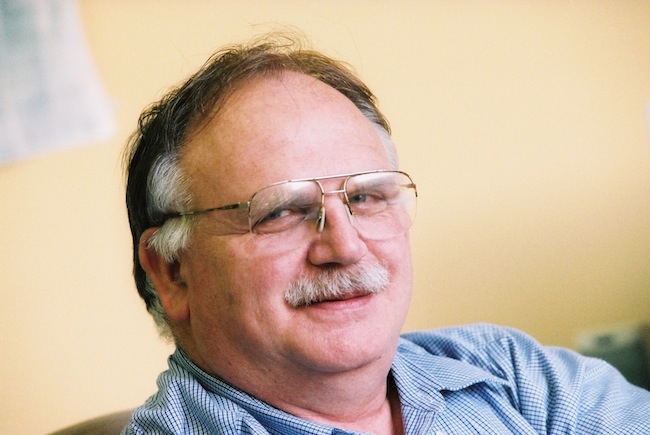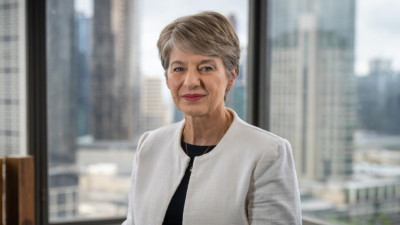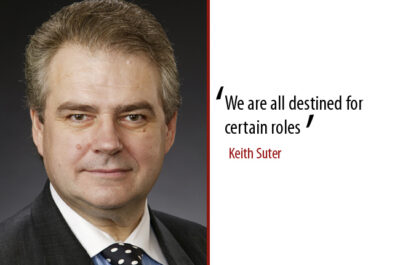Reflections on funds management … and more important matters
Professor Ron Bird… ‘clients usually better off if their managers do very little’
Ron Bird, still widely known in the funds management industry as “The Professor”, is easing himself towards retirement after a notable career in both funds management and academia. He speaks with Greg Bright about that career and his investment beliefs.
To my mind Ron Bird was always fairly outspoken. Not just when he was an asset consultant at Towers Perrin in the 1980s – one of Australia’s first – and not just since he returned to academia after several years at the pointier end of funds management with GMO Australia. Even as a fund manager he never seemed shy about calling a spade a spade.
But he sees it a little differently. “I don’t know that I was so outspoken, but there must be a time in your life when you can say what you think,” he says. “Maybe it’s on your deathbed.”
I remember Ron saying to me in about 1988, when he had joined Towers Perrin, that fund managers were paid too much and the problem with this was not so much about the inequity of the food chain, or the additional fee charges for clients, but more about the adverse affect this will have on gross client performance numbers.
He said, back then, words to the effect: “Because they’re paid so much they think they should always be doing something, tinkering with the portfolio. But the client will usually be better off if they do very little.” Recent research he has completed confirms that any outperformance coming from the managers is attributable to the design of their process whereas their active implementation (i.e meddling) actually detracts from their performance.
He was actually making a point about indexing, for which Ron has long been a big supporter although he points out that you cannot have everybody indexing as then pricing in markets would become even more inefficient. He also sees some merit in smart beta which he semi-seriously refers to as “dumb active” which he observes is a prime example of the extent to which the industry charges extortionist fees”. .
Bird has been studying “the system” – the capital markets system, the pensions system, the funds management system – since the 1970s, after graduating with a Masters of Economics from Monash University. Everyone thinks he is a mathematician, but he’s not. He’s an economist.
“It’s probably because I always have been involved in the quant style of investing,” he says. “But I was actually quite bad at maths at school.” In one of his early pieces of work, in the mid-1970s, he looked at the performance of Australian super funds. This was about 10 years prior to the start of more universal super. Bruce Cook, the founder of Mercer in Australia provided Bird with the data for the study which concluded that on a risk-adjusted basis superannuation funds were unable to outperform very simple indices. He remembers arguing with Bruce the case for measuring risk-adjusted performance but many years later came to agree with Bruce that it is “not worth anything”,
Even though Bruce Cook, who was the earliest proponent of fund manager performance charts, was firmly at the helm of what was known as Mercer, Campbell Cook & Knight, Towers Perrin actually beat Mercer to the establishment of a separate group of consultants devoted to advising on investments.
As an aside: it’s a disputed point whether Towers Perrin, initially with the likes of John Bowers, Chris Condon, Meredith Brooks and David Lee, started their asset consulting arm before or after Craig Ueland opened the then Frank Russell office in Sydney in 1986. Both likely happened in the same year.
“TPF&C established asset consulting in Australia prior to the US parent” Bird says. “The US regarded the move as too risky but to his credit, Chris White had the foresight to go with Australia first.” The first major breakthrough came with the promotion of a hub and spoke structure incorporating specialist managers. And then there was the overarching trend of asset growth, initially through Award Super, and then through the Superannuation Guarantee.
“Prior to the asset consultants coming along, the actuaries had been doing investment consulting too, as part of their roles,” Bird says. “So that created an internal battle. We were taking away something that was probably the most interesting part of their work.” When Mercers eventually followed suit and set up a separate asset consulting practice, they were far less innovative but much better at making money from it in the end. “The way to make money from asset consulting is to have your own product to sell over and over, so you’re not reinventing the wheel all the time,” Bird says. Towers Perrin actually owned a tiny master fund system in the 1980s and sold this because it was thought it represented a potential conflict with the consulting work. Mercer, of course, subsequently developed its own trusts,and at least initially seemed to do a good job of keeping this business separate from consulting
But that kind of attitude demonstrated by Towers Perrin suited the career of Professor Bird, who retired from teaching in Australia, at University of Technology Sydney, at the end of 2011, but continued as Director of the Paul Woolley Centre (PWC). But more of the PWC later.
“My main focus through my various careers has been largely to keep myself intellectually stimulated,” Bird says. “This is best done within an academic environment but academics are not well-paid. After nearly 20 years teaching at Universities, I came to the conclusion that my enjoyment was coming at a cost to the family. Fortuitously this realization came at a time when my work on portfolio insurance resulted in me receiving several job offers. At the ANU, I used to say that I did not want to employ anyone who could not double their salary by leaving. I was a bit worried that I would fail my own test but fortunately did achieve this goal after 12 months.
Bird’s academic career started at Macquarie University in Sydney, as a lecturer, in 1970. He moved to Canberra in 1973 eventually to head up the Commerce Department within the Economics Faculty. His stint at the ANU proved to be the longest in his career with him leaving in 1988 to join Towers Perrin. A few years later the ANU recognised the contribution that he had made by making him an Emeritus Professor.
One of his funds management bosses once said to me, words to the effect: “You never get to really hire Ron; you can only ever rent him.”
So begins the funds management career. Bird left Towers Perrin in 1992 to join Westpac Investment Management where his responsibilities extended to the development and application of quantitative techniques to funds management, the development and implementation of derivative strategies and all aspects of performance.
But his family was still living in Melbourne and he was commuting between Sydney and Melbourne and not very happy about it. After 15 months his family joined him in Sydney but shortly after that Ron decided to leave Westpac and take up a new job at the then-Government-owned Commonwealth Funds Management, in Canberra.
“That was a big mistake,” he remembers. The move did not go well and CFM was on the path to being sold. But, as luck would have it, CFM allowed him to meet Jeremy Grantham, which led to the establishment of GMO Australia within a year.
“At Westpac we had Russell as adviser and their staff suggested that I would find it interesting to visit GMO [in Boston] and meet Jeremy Grantham [the co-founder and still CIO/CEO] when next in Boston. My next visit to Boston came shortly after I joined CFM and I took the opportunity to meet visit GMO. While there Jeremy expressed an interest in setting up a joint venture in Australia, largely on the recommendation of John Nolan [founder of JANA]”.
GMO Australia was established in 1995 with Bird, John McKinnon and John Beggs, all previous asset consultants at Towers Perrin. The Australians had equity in the Australian company, which is the model GMO also had for the UK, where Paul Woolley was a founder. In such a model, some senior executives do well, and some senior executives do exceptionally well. Professor Bird did well. He left in 1998, before GMO decided to buy out the international executive shareholders and consolidate the group’s business.
“I left asset consulting because I started to think that I was not doing anything which was of much use to anyone,” Bird says. “Then I left funds management because I started to think I was not doing anything which was of much use to anyone… But GMO was good to me. When I went back to teach at UTS, in 1999, they still contracted me for work until 2002.”
His last role in funds management was not such a happy one. While at UTS, Bird advised and oversaw the quant system being built for Michael Triguboff’s MIR Investments, assumed by Challenger in 2012 after major client and staff losses. But the early period was very successful. MIR got up to about $4 billion in funds under management within two years of launch, having delivered outperformance of about 13 per cent in the first 12 months, before the wheels fell off. Bird will only say about the ending: “Michael [Triguboff] is a great salesman but we had different ideas about the firm”.
Back at UTS, Professor Bird taught honours and masters subjects in the areas of corporate finance and investments, and coordinated and the Finance Schools’s honours program. In early 2007, he took on the role of Director of the new Paul Woolley Centre of Capital Market Dysfunctionality at UTS. This was one of three such Centres established and funded by Paul Woolley after he retired from GMO Europe, with the other centres being located at the London School of Economics and Toulouse University. The funding for the Centre is due to run out at the end of 2014 and its future beyond this date is uncertain at this time.
Paul Woolley established the centre’s to examine the extent to which capital markets and financial institutions contribute to the betterment of society. As a consequence the research tends to be a little confronting for the financial services industry. The centres have had an impact worldwide rasing awareness of failings in our financial systems and how they are governed.
Bird says: “Once the capital market gets beyond a certain size, there is evidence that it actually makes a negative contribution to economic growth with any wealth created ending up in the hands of the people providing the financial services… Not even their shareholders get it: it just goes to management.” Given the background of Paul and Ron, it is not surprising that the Centres have concentrated much of their research on fund managers, A recent study conducted by the UTS Centre, provides both good and bad news for managers. As Bird says: “The good news is that the typical manager does have stock selection skills. The bad news is that at any point in time, the typical manager cannot identify more than five stocks worth investing in. The unfortunate outcome being that the potential benefits associated with these stock selection skills are diluted in diversified portfolios with the end result being that managers as a group do not deliver outperformance.” The other area of concentration at the UTS Centre is superannuation where Jack Gray, who works part-time for the Centre, and Ron Bird have most recently been working on agency problems confronted by the funds.
Ron Bird, who turns 68 next year, has recently taken on a part-time Chair at the University of Waikato in New Zealand, where his main role is to supervise PhD students. He regards his involvement with the PWC as one of the more satisfying segments of his career and continues to look for intellectual challenges in “semi-retirement”.










